Feb 26, 2018
Living in Akihabara: Anything beyond the otaku, tech & duty-free?
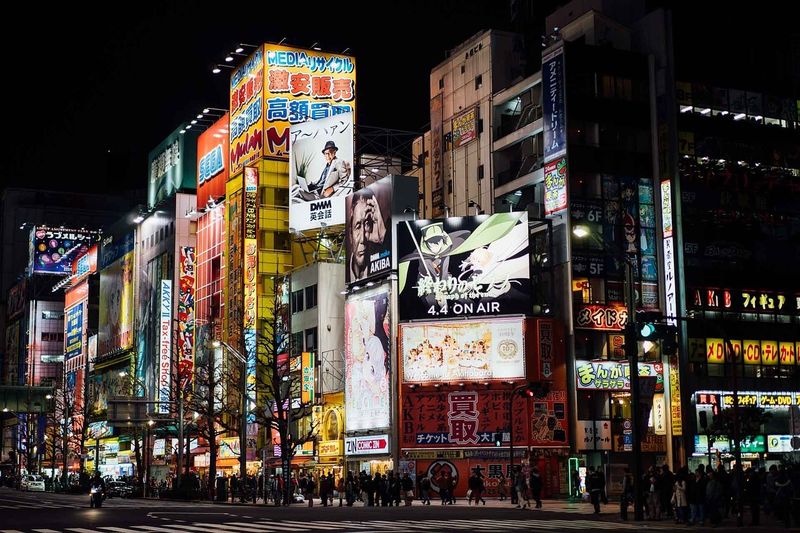
Taken at surface value Akihabara, Tokyo is likely a polarizing place. For some, the mix of otaku culture, tech / duty free shopping, video game / manga / anime resource, and maid cafe entertainment is a giddy dream. For others Akihabara may appear plain unsavory, a claustrophobic Petri dish incubating the growth of the socially stunted and the rabid consumer.
Akihabara does afford some middle ground, though. For the first-time Tokyo tourist it’s an “only in Japan” curiosity, a box to tick. Even for the Tokyo expat Akihabara’s tech and gaming resources might demand a visit from time to time. But does this middle ground offer any further coverage? Is there anymore to Akihabara outside of that which makes the district famous?
Perhaps so. Since the opening of a train station in the late 19th century Akihabara has been in a constant state of boom which has seen it come a long way from its days as an entrepreneurial fruit and veg market, a “yachyaiba no machi” (やっちゃ場の街) as such places were known. From post-WWII black market, through household appliance, computer, and stereo dealer, Akihabara is now a pop-culture phenomenon (think AKB48, OK on the wane but the cafe seems to be doing a stiff trade) and a magnet for coach loads of duty-free shoppers. At the heart of this growth and adaptation is the very thing that started it all, the train station. Without doubt, Akihabara Station is a transit hub, reason enough for many Japanese to think about living within walking distance.
Akihabara Station is served by five train lines. Not just any old tin-pot operators though. In the Yamanote, Chuo-Sobu, Keihin-Tohoku and Metro Hibiya lines Akihabara handles human traffic from the heaving suburbs of Chiba, Saitama, Kanagawa and west Tokyo. It connects to business centers like Marunouchi and Kayabacho. And entertainment / shopping Meccas Roppongi and Ginza are only one train ride away. Since 2005, Akihabara became the terminus for the Tsukuba Express bringing Ibaraki Prefecture within commutable distance. However one looks at it, Akihabara's station credentials are impressive.
As is the location. From Akihabara, Ueno, Tokyo (station), Kanda (for books and sports gear), and Suidobashi (Tokyo Dome) are all within spitting distance. So, even if you’re not into Akihabara’s primary appeals, living here, at least you can get out easily!
But there are plenty of convenient train stations serving Tokyo, and those that make for cheaper places to live -- average rents for living in Akihabara are over 100,000 yen per month for a one-room shoe box (emphatically not cheap, not even close - source Lifull Home’s).
No, what else does Akihabara have going for it? Are there reasons beyond the tech and otaku treasures to come here, even live in Akihabara?
While the immediate station building is dominated by Yodobashi Camera it’s worth noting that the same store also houses a branch of Tower Records. It can’t compete with the branch in Shibuya (or the one in Shinjuku) but such record stoes are a rare breed these days so Akihabara should be proud of housing one.
Also, the food-court / restaurant floor of Yodobashi Camera, YY Gourmet, might come as a pleasant surprise.
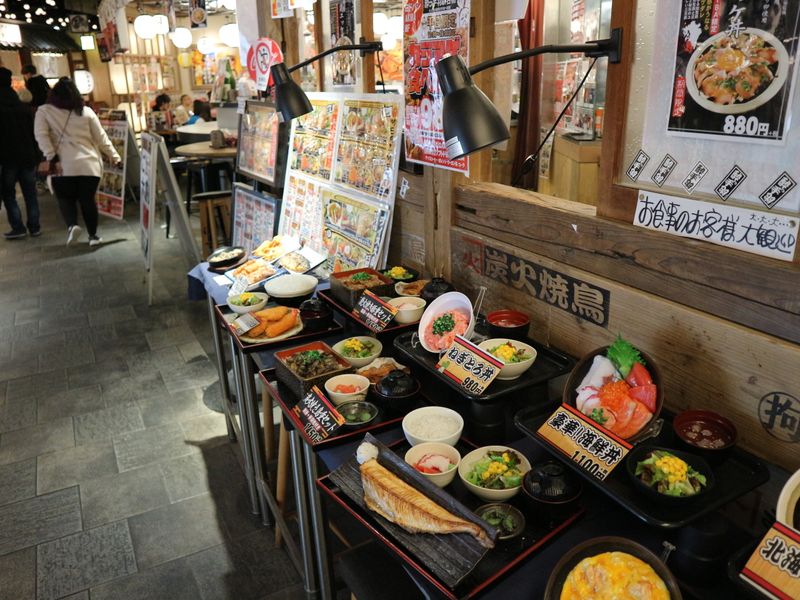
Recently spruced up, the floor boasts a pretty impressive line-up of eateries, particularly if you are holding a “Western” palate. There’s also a craft beer bar up here, and a novelty attempt that the traditional Japanese “food alley,” a bit like, say, an Omoide Yokocho in Shinjuku, only much smaller! YY Gourmet should also be praised for not pandering to the Akihabara image, it is devoid of this area's traditional themes. Well played!
Sex shops in Akihabara make perfect sense and no sense at all, to the same degree that the area might polarize opinion. They make no sense because Akihabara is about as unseductive a place as one could imagine. Idols worshipped here exude the same kind of sex appeal as the inner workings of a computer or a set of duty-free hair straighteners, i.e. none. Nor is Akihabara romantic date territory. Even if you’re a fan, mood-setting restaurants are sparse, and the rabid sense of consumption can really grate.
Where they do make sense is in all the kit and accoutrements they provide for those of us who aren’t seeing much, if any, action in the bedroom, with another person present, that is. Call it a gross generalization if you will, but this expat would venture to say that there are a lot of such people in Akihabara.
Smirking aside, the sex shops in Akihabara should be considered a genuine and serious resource in this field. They stock just about everything one could conceive of (and way more besides), they are easy to enter (you’ll be browsing with people of all stripes), and if you are shy about making purchases it’s easy to convince yourself that you’re new to all this and are just sampling some Japanese novelty (plus, goods are handed over in plain brown paper bags and then put into plain plastic bags for extra discretion).
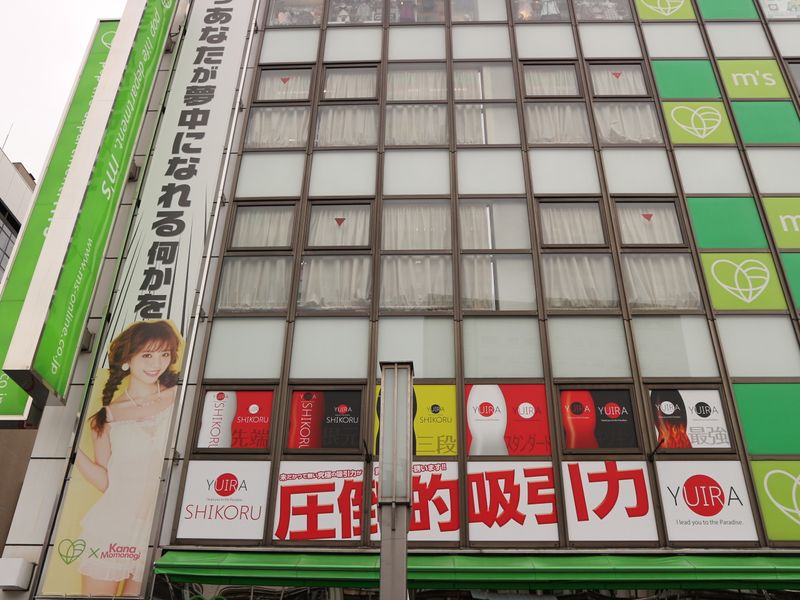
(Akihabara sex shop, not looking particularly sexy)
A word of warning though, these places are no-holds-barred. It’s all above board and legit (as far as this expat can tell) but some of the imagery may stretch the boundaries of one’s pornographic tastes (if you have any at all).
Reason enough to be a regular? Well, if you’re in the market for this sort of thing, why not? Do you know where else these shops are?
Arts, crafts, local produce - North of Akihabara Station, following the Yamanote Line tracks north towards Okachimachi Station, are some relatively new additions to Akihabara’s shopping and dining scene -- 2k540 Aki-Oka Artisan and Chabara.
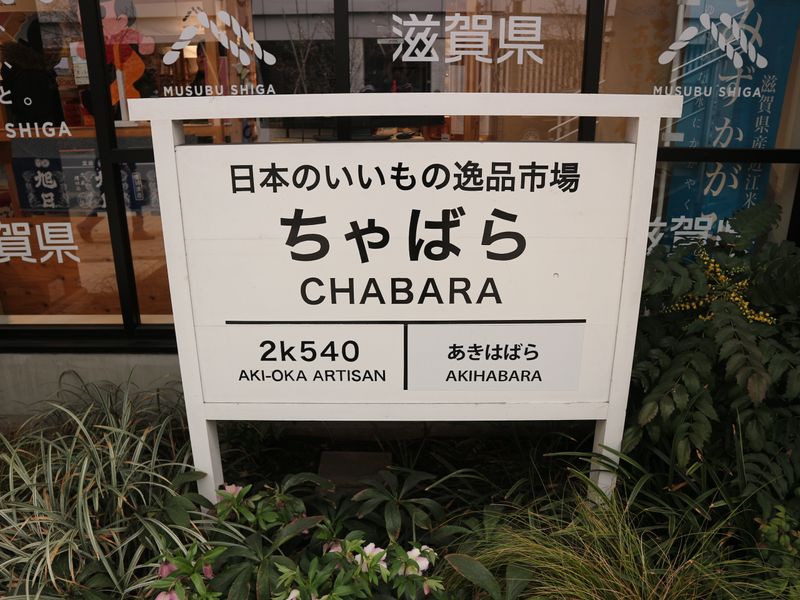
Starting with Chabara, what appears to be a kind of food emporium for local produce from around Japan. Chabara certainly offers a rich shopping experience, if you know your regional Japanese produce -- sake, crackers, sauces, rice, miso products, preserves. There are also some nice-looking juice bars and coffee providers here, as well as a place to taste sake.
For most, however, Chabara is likely a niche / novelty shopping or browsing experience. If you’re coming here for your everyday / sundry items you’ve either got plenty of money or you really know your stuff.
A little further on is 2k540 Aki-Oka Artisan, a tastefully reformed space under the train tracks. It’s a far cry from the Akihabara image and should, perhaps, be celebrated for that. Combining art studios, craft stores and cafes, 2k540 Aki-Oka Artisan is a rewarding experience … for the first-timer and those who are into their arts and crafts. There are around 50 business operating here selling things like glasswork, leathers, paints, jewellery and stationary. The cafes are tasteful and well thought out and would make for a nice lunch date.
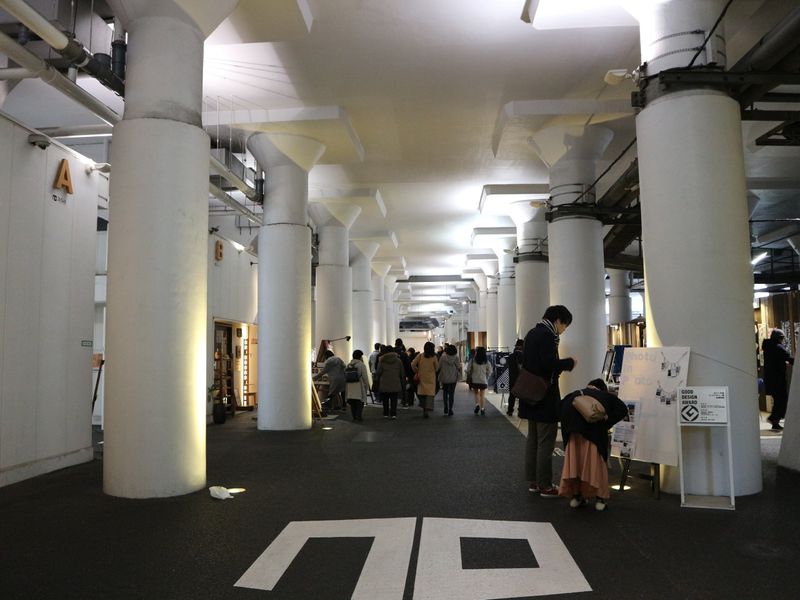
Is 2k540 Aki-Oka Artisan reward enough for regular visits to Akihabara? Debatable, but it’s here and if you’re in need of arts and crafts, perhaps as a present for others, it is a legitimate resource.
Staying north of Akihabara Station and under or close to the train tracks, between 2k540 Aki-Oka Artisan and Chabara there is a branch of Hanamasa, the supermarket favored by many expats as a resource for cheap(ish) meet, fruit and veg. To the layman this might not sound like much, but branches of Hanamasa can be treated like gold dust by some expats.
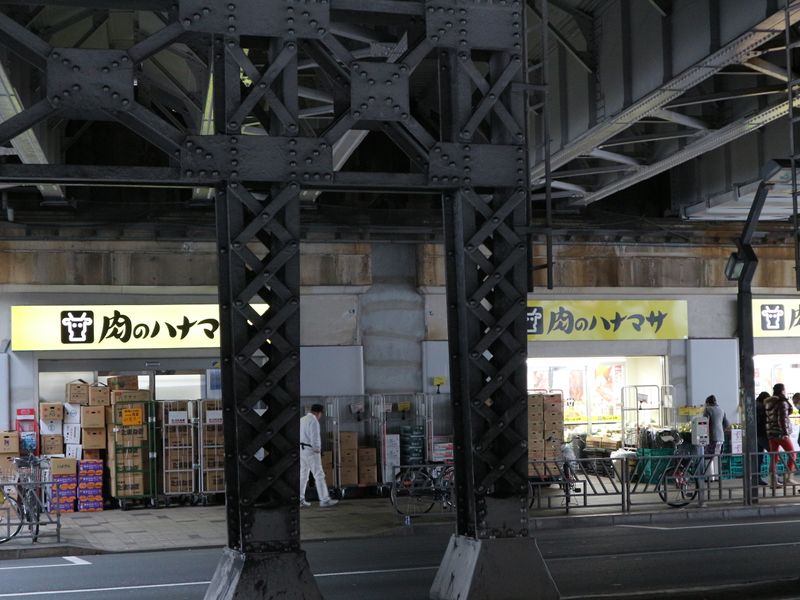
Not really a “living” resource, or indeed a repeat visit kind of situation, but those go-karts driven by foreigners dressed-up as Mario characters you’ve likely seen buzzing around the streets of Tokyo are operated out of an office around here.
Just the other side of the tracks from Chabara is a branch of popular expat / locals who want to mingle with expats watering hole, HUB. But you can find them around any train station of significant size in Tokyo. Still, Akihabara does have one. A plus point for some.
While pretty much all of the “Akihabara” action is found west of the train station (on and around Chuo Dori), to the east Akihabara looks quite different. Here, either side of main thoroughfare Showa-dori Avenue, the area is conspicuous by the absence of otaku, tech, and duty free. Strangely, it feels a little lonely for it, but this might be a plus point for some.
While one or two massage places make for a slightly seedy feel, a little further north from the train station, Le Cyc Akiba is a well-stocked cycling shop. Back towards the station you’ll find a Burger King. Again, for the layman, maybe nothing special, but BK isn’t always an easy find in Tokyo so, for some, it might be good to know that there’s one here (there’s also a McDonald’s close by).
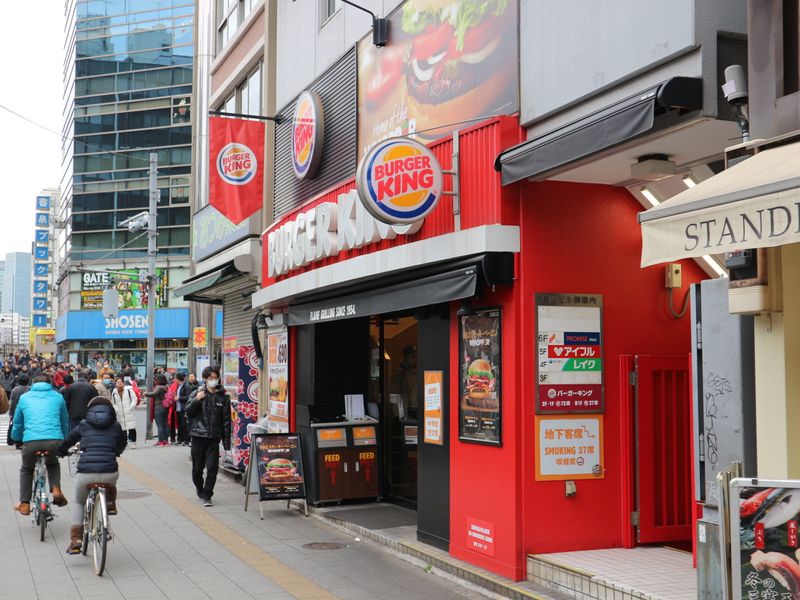
Staying east of the train station, heading south you soon come to the banks of the Kanda River and Izumi Bridge. A grubby little park (Shinsui Terrace) has views over the river and a smoking area (there are not so many around Akihabara, and nothing in the immediate station vicinity).
There are some nice streets to explore south of the river. On the southern banks you’ll find R.L Waffle Cafe, the “vintage Scandinavian” interiors quite un-Akihabara. The cafe also has nice counter seating overlooking the river. Next door, BRICKS Music Salon offers classes and rooms / gear for musicians to rent where they can jam and practice.
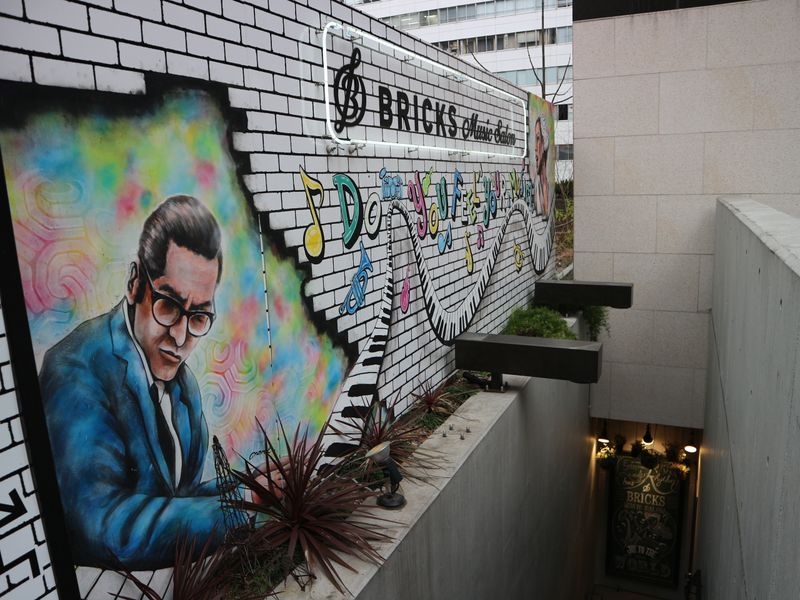
A little further on, Yanagimori Shrine (柳森神社) is a charming little spot to have a quick poke around.
Does all of this from reason enough to come to Akihabara outside of the obvious, nay, even make living in Akihabara a legitimate appeal?
In brutal honesty, no, as far as this expat can tell. Akihabara is emphatically what its image suggests it is -- a place to gorge on, or sample, otaku culture, and a place to find English-title video games, cheap tech, and the best Yodobashi Camera in Japan. If you’re into this kind of thing, Akihabara is surely as good as they come. If not, it’s completely out of proportion with everything else and living here will likely be a challenge at best, a nightmare at worst, even if 100,000 yen / month rents are accessible to you, and you like the idea of a convenient transport hub.
Perhaps the question of living in Akihabara should also be addressed to those for whom the area's specialities have a strong appeal. Past polls have shown that "Akiba" is the dream residence for single men in their 30s but demographics aside, is it actually a wise idea to live surrounded by that which would normally serve as ether of escape? Can one live in a permanent state of "escape," or would it eventually dull the experience?
Would living in Akihabara, or any area of Japan with a distinct flavor, suit you? Know of any Akihabara treats beyond the tech and otaku? Let us know in the comments.
See us on ...
Twitter and Facebook: @citycostjapan



0 Comments